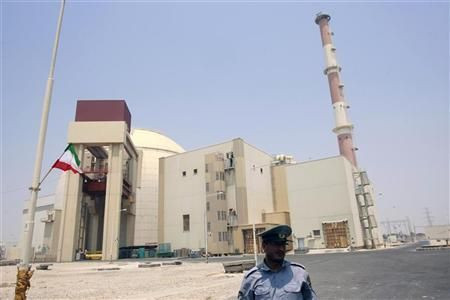Rest assured -- Nuclear Talks With Iran Are Resuming
Opinion

Good news, everyone. Nuclear talks are resuming on Feb. 26 between Iran and the P5+1 -- the five permanent members of the U.N. Security Council and Germany -- and not a minute too soon.
The Islamic Republic has been making notable progress on the nuclear front, perhaps even approaching an ominous “break-out” capability on technology and know-how, and it’s flexing its muscles directly and through its terrorist clients in ever bolder ways both in the region and far from it.
I was even starting to worry about how an Iran with nuclear weapons would behave on the world stage.
After all, Tehran told the International Atomic Nuclear Agency, or IAEA, late last month that it would install more sophisticated equipment at its main uranium enrichment facility at Natanz, perhaps doubling or tripling the speed at which it could enrich uranium and moving it ever closer to producing weapons-grade material.
Though Iran often exaggerates its nuclear progress, nuclear and military experts suggested it may not be bluffing this time. Olli Heinonen, a former top IAEA official, explained that Iran started buying the materials needed to make better centrifuges about a decade ago, when sanctions against it were not as tight as they are today.
Meanwhile, Amos Yadlin, a former Israeli military intelligence chief, estimated that Iran could build a nuclear bomb in four to six months, adding that it has compiled all the necessary components to do so.
Responding to ever-tightening sanctions and mounting Israeli threats to attack Iran’s nuclear sites before it reaches the “break-out” capacity, Tehran has threatened to retaliate by closing the all-important Strait of Hormuz, through which flows about a third of the world’s oil that is transported by sea.
That’s why the United States has announced that, in May, it will lead more than 20 nations in an anti-mine exercise in “the Middle East’s international waterways,” making clear it will do whatever is necessary to keep the waterways open. It’s the second such exercise, following a U.S.-led multinational effort in September.
Beyond nuclear weapons, Iran is flexing its muscles in evermore bold ways. Defense Secretary Leon Panetta recently accused its paramilitary force, the Iran Revolutionary Guard Corps, or IRGC, of waging a campaign to destabilize the region by smuggling anti-aircraft weapons to rebels who are fighting America’s regional allies.
With U.S. help last month, Yemen intercepted an Iranian shipment of such weapons -- which could put airplanes at risk -- and Washington plans to work with its regional allies to better stop such shipments.
Meanwhile, a top counterterrorism expert reported this week that Iran’s Quds Force (an elite branch of the IRGC) and Iran’s top terrorist client (Hezbollah) decided in early 2010 to work more closely together to attack the West and Israel.
In a 17-page study, the Washington Institute for Near East Policy’s Matthew Levitt wrote that Iranian leaders “assigned the task of targeting Israeli tourists -- a soft target -- to Hezbollah, and maintained for the Quds Force operations targeting Israeli, American, British, or Gulf States’ interests. The latter would be carried out by a new special external operations unit known as Unit 400.”
Levitt issued his study just as Bulgarian officials were announcing what everyone suspected -- that Hezbollah was responsible for a July bus bombing at Burgas, a Black Sea resort, that killed five Israeli tourists and a Bulgarian bus driver.
For those of you who are keeping score, Feb. 26 will mark the umpteenth restart of nuclear talks between Iran and some group of global powers that date back a decade. (Sorry, but I’ve lost track of the precise number.)
All of those talks have proved pointless, of course, except for those who work in the corridors of power in Tehran. There, the mullahs surely laugh as they alternately raise and dash the hopes of Western diplomats, all while making steady progress on the nuclear arsenal they so obviously want.
The next round of talks surely will prove no different, as Tehran is already indicating. Abdollah Haj-Sadeghi, Supreme Leader Ali Khamenei’s representative to the IRGC, said this week that the global powers “will never want real dialogue and negotiations” but, instead, want to “inhibit the Islamic revolution.”
Besides, neither side is budging from its hardline opening position. Iran wants the global powers to first lift all sanctions, while the P5+1 wants Iran to first stop enriching uranium to 20 percent, ship its stockpile of such enriched uranium out of the country, and shut its underground, bomb-resistant Fordo facility.
Nevertheless, I’m feeling much better.
Nuclear talks with Iran are resuming.
Lawrence J. Haas, former communications director for Vice President Al Gore, is a senior fellow at the American Foreign Policy Council and author of “Sound the Trumpet: The United States and Human Rights Promotion.”
© Copyright IBTimes 2024. All rights reserved.





















